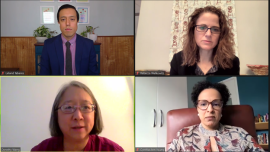Sizing Up The Chair
When
In the opening episode of Netflix’s recently launched series The Chair, Ji-Yoon Kim, played by Sandra Oh, delivers her first speech to her colleagues as the first woman, and first woman of color, to serve as Chair of the Department of English at Pembroke University: “I’m not gonna sugarcoat this. We are in a dire crisis. In these unprecedented times, we have to prove that what we do in the classroom . . . is more important than ever and has value to the public good.” Hailed by The Atlantic as “Netflix’s Best Drama in Years,” The Chair has elicited much discussion from viewers and critics, and academics and non-academics, about its treatment of a range of issues including the crisis in the humanities, freedom of speech, departmental politics and culture, and matters related to diversity, equity, and inclusion. The panelists on this webinar tell us what the series gets right and wrong and share what they perceive to be the series’ achievements and contributions.
Panelists include:
- Dorothy Wang, Professor and Chair of the American Studies Program, Williams College. Wang is the author of Thinking Its Presence: Form, Race, and Subjectivity in Contemporary Asian American Poetry (Stanford University Press, 2013), which won the Association for Asian American Studies Award for Best Book in Literary Criticism. Her areas of expertise include twentieth-and twenty-first century Asian American literature, poetry and poetics, including experimental minority poetry.
- Rebecca L. Walkowitz, Dean of Humanities and Distinguished Professor of English, Rutgers University. A former Chair of the English Department at Rutgers University, Walkowitz writes and teaches courses about modernism, the contemporary anglophone novel, and world literature. The author and editor of many volumes, Walkowitz’s current book project, Future Reading, shows how a new generation of migrant novelists, essayists, and nonfiction fabulists are changing the way we encounter world languages. Ultimately the study calls for rethinking how we organize, publish, review, honor, and teach the literary works circulating today.
-
Cynthia A. Young, Associate Professor of African American Studies, English, and Women's, Gender, and Sexuality Studies, Penn State. Young is the author of Soul Power: Culture, Radicalism and the Making of a U.S. Third World Left (Duke University Press, 2006), which looks at the influence of Third World anticolonialism on activists, writers and filmmakers of color in the 1960s and 1970s. Her current manuscript, Terror Wars-Culture Wars: Race, Popular Culture and the Civil Rights Legacy After 9/11, considers the contours of popular culture and contemporary discourse in the wake of the attacks on the World Trade Center and the Pentagon. Of particular interest are questions of black citizenship and immigrant exclusion.
Moderator:
- Leland Tabares, Visiting Assistant Professor of English, Loyola University New Orleans. Tabares’ work centers on literature, labor, and racialization in twentieth- and twenty-first-century American culture. His first book project, Professionalizing Asian America: Race and Labor in the Twenty-First Century, traces the ways that Asian Americans’ increasing representation in a diverse range of contemporary industry professions—from the university and the modern restaurant industry to the Silicon Valley tech industry and digital media platforms like YouTube—enculturates new meanings of race, generationality, and belonging.
